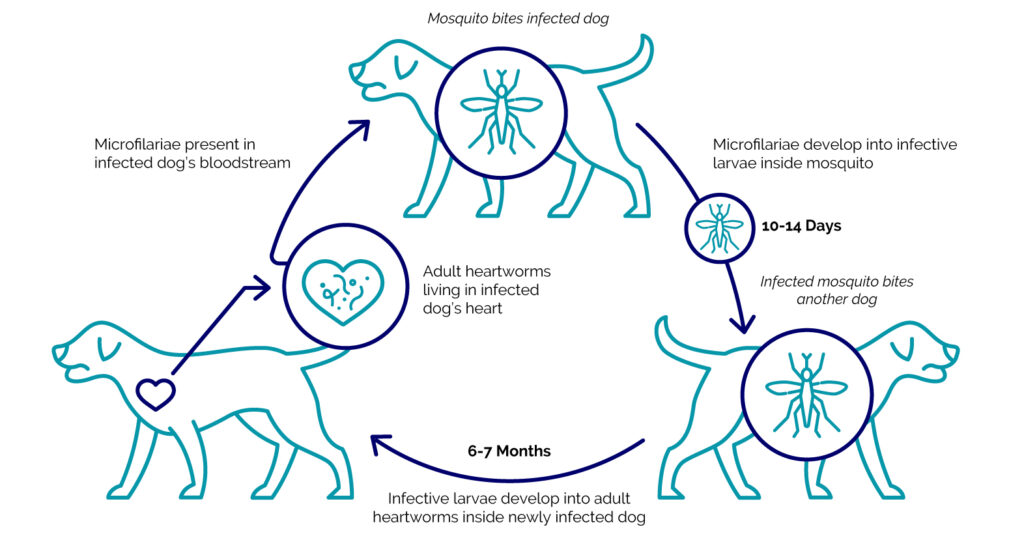Heartworm is a potentially fatal parasitic disease that can affect dogs, cats and even ferrets throughout Australia.
What is Heartworm?
Heartworm (Dirofilaria immitis) is a parasitic worm transmitted through the bite of mosquitos. When a mosquito feeds on an infected dog, the immature stages of the heartworm known as microfilariae enter the mosquito. The microfilariae develop into infective larvae inside the host mosquito until they are passed on to other dogs, cats, and ferrets via mosquito bites. Once an animal is infected with the larval heartworm, it can take up to seven months for them to become adult heartworms. The adult heartworms live within the heart, lungs and surrounding blood vessels, giving them the name ‘heartworm’. The adult heartworms breed and release Microfilariae into the infected animals blood stream, and the cycle starts again.
Heartworm Lifecycle

Signs & Symptoms Heartworm disease
Heartworm disease affects cats and dogs very differently, as the cat is not the normal host for heartworm. This means that in the cat, even the immature worms can cause severe clinical disease, in cats this is referred to as heartworm associated respiratory disease. Heartworm is considered a disease with a slow onset, and it may take many months (and in some cases years!) for clinical signs to be present.
| Species | Symptoms |
| Feline | Vomiting, weight loss, coughing and/or asthma like attacks, decreased appetite, collapse, death |
| Canine | Canine Exercise intolerance, coughing, lethargy, decreased appetite, weight loss, distended abdomen. Dogs with large numbers of worms can develop blockages of blood flow in the heart leading to collapse |
Diagnosis
Heartworm is usually diagnosed by blood test at the veterinarian. Antigen tests detect the presence of adult female Heartworms in a small amount of blood. This means that this test does not detect the presence of immature Heartworms. There is also a test for microfilariae in the bloodstream. Again, this is unlikely to show a positive result in an infected pet who does not yet have mature Heartworms. For both tests, the pet needs to have been infected for up to 6 months in order to have fully grown Heartworms. It is possible to treat pets with immature stages of Heartworm to stop the mature forms from developing. This is why your veterinarian will often ask how long it has been since your pet was last on Heartworm prevention.
Treatment & Recovery
Your veterinarian will be able to discuss the best treatment plan for your pet with you but generally when a pet is sick due to heartworm, treatment involves killing the adult worms with antiparasitic medications as well as managing inflammation in the affected blood vessels and throughout the pet’s body. An antibiotic (Doxycycline) may also be administered as it affects the adult Heartworms as well as reduces the microfilariae in the pet’s blood stream. The treatment will depend on the individual pet and the severity of the clinical signs. In some severe cases, it may be necessary for the worms to be surgically removed from the pet’s body. Because the worms live in the blood vessels in and surrounding the heart, treating Heartworm can be quite risky, and dead worms can block the blood flow to these essential tissues. It is very important to follow the vet’s treatment advice and keep infected pets resting throughout the course of treatment.
Prevention
Thankfully, preventing Heartworm is relatively simple and there are a number of effective products available depending on your needs and vets recommendation. An annual heartworm preventative injection for dogs is available from your vet which can be done alongside annual vaccinations. It is important to ensure that pets don’t miss more than six months of Heartworm preventative medication. Ensure you speak to your vet who will be able to recommend an appropriate worming product for your pet. When pets are on Heartworm preventative medication, there may still be times when your vet recommends testing for Heartworm.
FAQs
How much does Heartworm cost to treat?
According to PetSure claims data in 2022 the average treatment cost relating to Heartworm was $925.00*
What should I do if I miss my pet’s heartworm preventative?
Don’t panic! Sometimes we forget our monthly treatments. The important thing is to know exactly how many doses are missed. If only one monthly heartworm preventative has been missed and all others were on time, resuming your normal regime should be fine. However, if you have any uncertainty about how many doses were missed, play it safe and have a heartworm test before resuming preventative treatment. If your pet has any chance of developing adult worms and you then give your pet heartworm treatment without veterinary supervision, this could cause serious complications to your beloved pet.
How much does a heartworm test cost?
According to PetSure data, in 2022 the average cost of a heartworm test was $60.20. Please note that this does not include examination fees, blood collection fees and any other treatments or services your vet may need to perform on your pet.
Can heartworm be passed from one dog to another?
No. Heartworm requires the mosquito as the intermediate host. This means that one dog cannot directly pass on heartworm to another dog.
When should you start heartworm prevention in puppies?
It does depend on the product but typically it can be started anywhere between 6-12 weeks of age. Your vet may have a specific protocol they recommend, and will be able to guide you to the best product to use on your pet.
Should I give my cats heartworm prevention?
While cats are less likely to become infected with heartworm, it is still recommended that you give them preventative treatment, as infection in cats is usually very serious. Thankfully, a lot of products available will treat fleas, worms, and heartworm, making it a lot easier to manage. Discuss the best product for your cat with your vet, and don’t forget, a heartworm test is likely to be needed if starting on heartworm prevention for the first time.
*Reimbursement for this claim would be subject to limits, such as annual benefit limits or sub-limits, benefit percentage, applicable waiting periods and any applicable excess. Cover is subject to the policy terms and conditions. You should consider the relevant Product Disclosure Statement or policy wording available from the relevant provider. Treatment relates to Heartworm and all medically related conditions in that policy period.
References:
1. Ames, M., Atkins, C., 2020, Treatment of dogs with severe heartworm disease, Veterinary Parasitology
Pet insurance can help by covering a portion of the eligible vet bill if the unexpected happens. Because it is difficult to predict the costs of veterinary care, it can help to have measures in place to help prepare for the unexpected. Check out our partner network and explore our policy tools to find a pet insurance policy.
Not all conditions or items are covered by Pet Insurance. Refer to the applicable Product Disclosure Statement for information about coverage and exclusions.



 Fact checked
Fact checked




